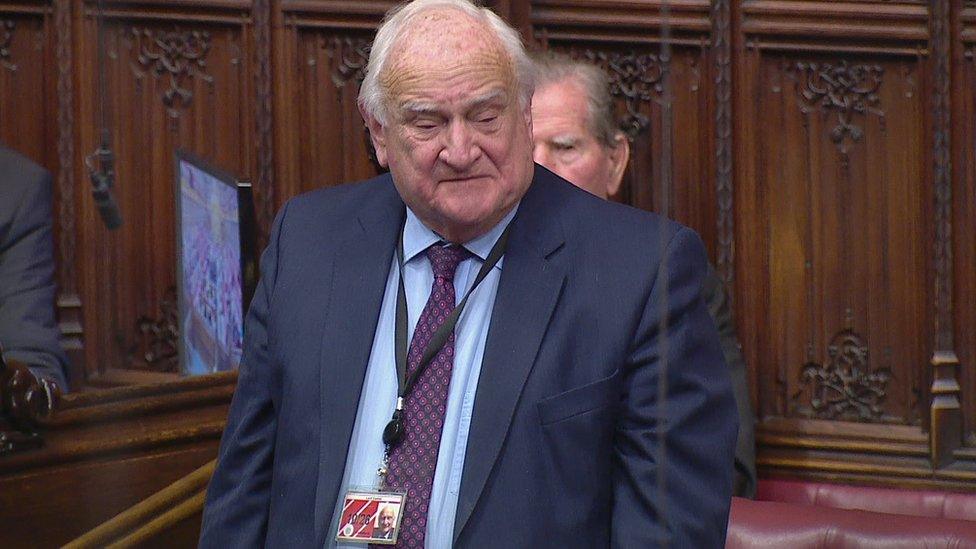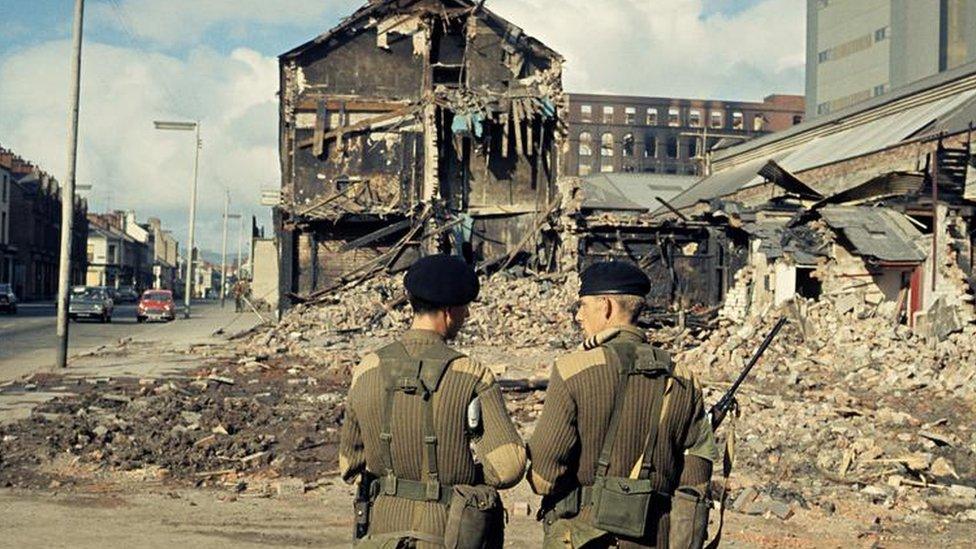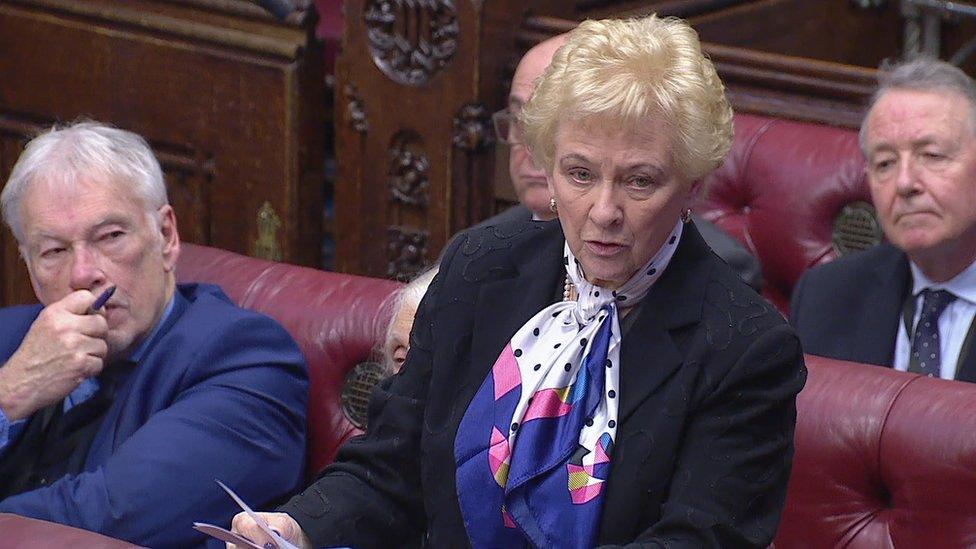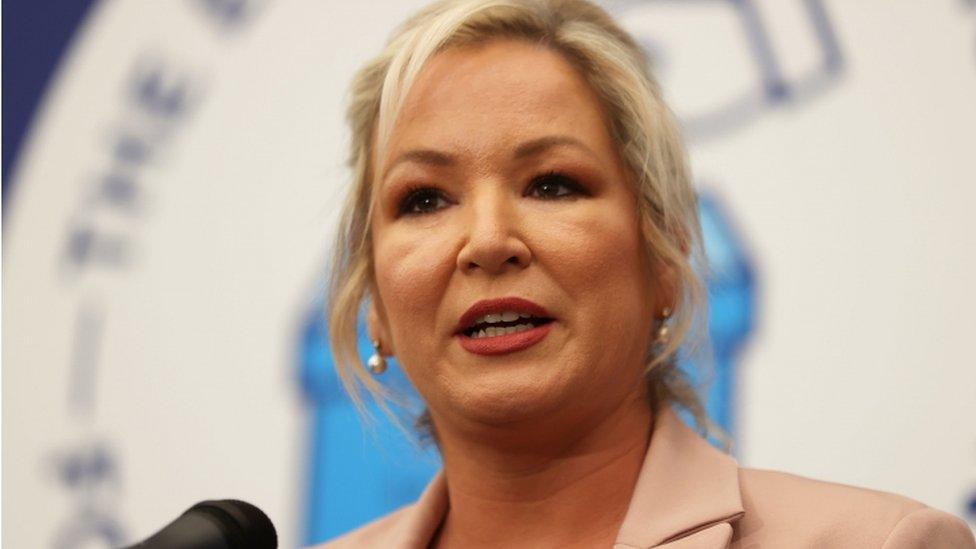NI Troubles: Lord Eames says government bill is total disaster
- Published

Lord Eames says the government has failed to put victims' needs at the heart of the bill
Government legislation offering a conditional amnesty to people accused of killings during the Troubles is a "total disaster", former Church of Ireland Primate Lord Eames has said.
He was speaking during a debate on the bill in the House of Lords.
The government is attempting to amend its controversial legislation at its latest stage in the House of Lords.
Ministers have said their proposed changes include a more robust process on the immunity from prosecution.
"I have never, never, come across such widespread opposition to a proposal such as this as is the case today," Lord Eames told the House of Lords.
"The failure of this legislation to put at its heart the needs of survivors and victims and their families and their loved ones is a total disaster."
In 2009 Lord Eames was one of the authors of a detailed report on dealing with issues arising from the legacy of the Troubles, external.
The planned changes to the Northern Ireland Troubles (Legacy and Reconciliation) Bill, external have already been rejected by victims' groups and all of the political parties in Northern Ireland.

More than 3,500 people died during the Troubles in Northern Ireland
Democratic Unionist Party (DUP) peer Lord Dodds described the government's position as "invidious" and urged it to withdraw the bill.
He said it was "very clear that victims have been treated abominably by this bill and by this government".
He added: "That's a terrible thing to have to say about a government which is committed to the [UK] union".
"It needs to counter the twisted narrative that is out there about the Troubles, it needs to be more proactive in terms of the balance of the past."
'Blunt instrument'
Lord Dannatt, a former head of the Army who served in Northern Ireland during the Troubles, said he spoke for "the voice that's had enough of investigations being mounted on elderly soldiers... on the whim of evidence often causing a lot of fear and upset to them".
"Some of them are going to their grave with the allegations not fully investigated," he told peers.
"If this bill is intended by the government to stop that process it's a very blunt instrument to achieve a particular aim.
"On that basis I would ask the government to think again about this bill.

Baroness O'Loan says the government has not responded meaningfully to victims' groups about their concerns over the bill
"But if this bill is lost for all the very good reasons that people have been talking about what must not be lost is some way that veterans who did their duty are protected."
Former Northern Ireland Police Ombudsman Baroness O'Loan said there had been a "total failure to consult victims and survivors properly and to respond meaningfully" to concerns they had raised about the bill.
Northern Ireland Office Minister Lord Caine said he had sought to improve the legislation and had more than 30 meetings about it with political parties, victims' groups and others since July last year.
"Those meetings have always been frank, candid and I have sought to listen and to take on board as many points as I can," he said.
'Risk of legal challenge'
Lord Hain, a former Northern Ireland secretary, said he did not envy Lord Caine's task.
He added that he thought the bill as currently drafted was "most objectionable" and would have "the most devastatingly adverse impact".
Speaking at a protest outside the Northern Ireland Office headquarters on Tuesday, Sinn Féin MP John Finucane repeated his party's call to "stop the passage" of the legislation.
He said it was a "piece of legislation that doesn't enjoy support of any political party on the island of Ireland".
"I have no doubt whatsoever that if the British government continue to ignore the voice of opposition in this that it will ultimately lead to legal challenges around this," he said.
"[That is something] which nobody wants to do because it only adds delay into a process for some families who have already been waiting over five decades."

What is the legacy bill?
Legislation that aims to draw a line under the Northern Ireland Troubles by dealing with so-called legacy issues
The Northern Ireland Troubles (Legacy and Reconciliation) Bill runs to almost 100 pages
It was introduced in May in an attempt to deal with more than 1,000 unsolved killings
A central element involves immunity from prosecution for those who co-operate with investigations run by a new information recovery body
Victims' groups and political parties at Stormont are opposed to the bill, arguing it will remove access to justice for victims and their families
Veterans commissioner Danny Kinahan gave the bill a cautious welcome and it is also supported by the Northern Ireland Veterans Movement
The bill had its second reading in the Lords on 23 November. The government told peers it would bring forward amendments including "a more robust process" around immunity from prosecution
Lord Caine of the Northern Ireland Office said the Independent Commission for Reconciliation and Information Recovery (ICRIR) would be able to conduct criminal investigations
The amendments will next be discussed at committee stage on Tuesday

The government said its amendments would:
Confirm that the ICRIR established by the legislation will be able to conduct criminal investigations where it judges that to be appropriate
Ensure that individuals who knowingly or recklessly provide false information to the ICRIR can be prosecuted and have their immunity revoked
Disapply the Northern Ireland (Sentences) Act 1998 for individuals who choose not to tell the ICRIR what they know and are then convicted of an offence so that they face a full, rather than reduced, sentence - the act states that anyone convicted of a Troubles offence after 1973 and before the Good Friday Agreement is eligible for early release after two years in prison
Increase the fine for non-compliance with the Commission
Strengthen the ICRIR's independence by making clear that the Northern Ireland secretary should consult individuals before appointing the chief commissioner
Related topics
- Published21 January 2023

- Published3 January 2023
